- Home
- Sean Platt
Resurrection Page 3
Resurrection Read online
Page 3
“Why me?”
“Because when I called, you came.”
Logan exhaled. Shook his head. But this was just blustering; Sadeem knew he’d do the right thing. He’d already committed himself and declared his intentions. The crossing wasn’t easy, and even the Mullah courier Sadeem had sent running to Stranger’s church sometimes got lost. Stranger might come and he might not, but he’d already done the important thing and sent word to Logan, corroborating the change he himself surely felt in the air. Clara had managed something, and someone had hit her back hard. They’d been through the end. Now they’d reached the end of the beginning.
Logan had come when Clara needed him. He wouldn’t turn back now.
“I can’t.”
“Logan.”
“She hates me. She’ll push me out.”
“Being pushed out is better than what I’m able to do. Look around before it happens. Find out if you can see the grid as she does. Clara’s talked for years about pieces shuffling themselves. They came back once because they felt an itch. Two decades in this cave, I’ve spent trusting the idea that she could make them itch again.”
“Stupid,” Logan said, looking down at Clara’s peaceful face. “I warned you. I told you something like this might happen.”
“Maybe. But you know Clara.”
Logan did. Uniquely.
Sadeem said, “You loved her once.”
“That was a long time ago.”
“I just need you to try. Look into her mind. I believe she succeeded, and broke their wall. I think they hit her back. But it will only work if they can keep her down. You can pull her out.”
“Why do you think that?”
“Because I can feel something changing, and see something shifting in the other Mullah — those who know the past because I taught it to them, but whose eyes are already lighting with new reasons to know it.”
Logan shook his head. His face softened. Sadeem was about to hear the real reason for Logan’s opposition — the truth behind why Clara and the Lightborn had parted ways.
It wasn’t because Logan felt Clara’s attempt to breach the Astral wall was futile. It was because he believed she could do it, and feared the consequences.
“They’ve finally left us alone,” Logan said, looking skyward, toward the cave ceiling. “They killed everyone we knew and destroyed all that we built, but then they went away so we could at least try to start again.”
Sadeem shook his head slowly.
“They never left. They’re still out there, and have been since we came to this place. They can’t leave. Not as long as the Lightborn keep their fingers under the lid to keep the box from closing. It’s not just Clara. It’s all of you.”
“But the rest of us aren’t trying to meddle. We’re willing to let it all go, and forget in time.”
Sadeem looked down at Clara, then back at Logan.
“Are you sure?” he said.
CHAPTER 4
Carl sat in Stranger’s vacated room as attendants ran back and forth outside, staring down at the polished silver sphere in his hand.
And he thought, Carl Nairobi.
It wasn’t his name. He was a blacksmith and a silversmith, same as his father. Apparently.
Although for the first time, as Carl looked down at his distorted reflection in the object Stranger had given him before rushing out to leave him alone, Carl thought how odd it was that he knew how to fire a furnace, forge metal, and wield a hammer.
And he thought of what Stranger had said, too: that Carl wasn’t strong because he was a smith, but that he was a smith because he was strong. The way Stranger spoke, there was an order to things that escaped Carl. Everyone was where they were because they’d fit their positions rather than being raised in stations and learning to fit them over time.
That wasn’t how he remembered things.
In fact, Carl didn’t remember things any particular way at all now that he thought about it.
His father, who’d taught him the craft and had the last name Smith first? Carl thought he remembered all of that, but after peering deeper inside realized he didn’t.
And his childhood? Carl didn’t remember that, either.
He remembered his dream much more vividly.
Himself, inside the monolith as it crossed vast oceans of open water.
And peril. Some unknown, unarticulated horror that crept down Carl’s backbone the longer he dwelled upon it.
Carl Nairobi.
Had that truly once been his name? Stranger seemed to have been harboring secrets, but Carl found himself recognizing their truth rather than believing it. Same as Carl had known truths when …
When …
“Liza Knight,” Carl said aloud.
There was no more to the thought. But it mattered because his mind was on a different Liza Knight than the old woman who ran the rectory. He couldn’t quite catch the other memory, but he could almost see it, dancing at the edges of his vision: an impression of another Liza Knight in a different place. Someone he’d once almost feared. Or someone that others had. Not the same Liza. The one in his head was many seasons younger.
When do you believe we met?
Twenty years ago, Carl. Twenty summers and winters.
Carl stood. He set the small ball on Stranger’s vacated table. He didn’t need it. He was sure he had one of his own, somewhere at home. Wherever he needed to go, it would take him. Its witchcraft didn’t frighten Carl. He was increasingly sure, now, that he’d followed it once before.
The person whose spot you’ll be given the chance to take is the man who murdered your sister. And because I need you to refuse.
Carl didn’t know what it meant, but now he couldn’t stop hearing the voice in his head. It belonged to Stranger. It sounded weathered by time, antiquated, made fuzzy. But it was there, and true — as if the odd holy man had been right, that they’d met once before.
He remembered another house. Different. A coldbox that didn’t need to be buried in the cool dirt, for meat that didn’t need to be treated with salt. The room from some forgotten past, as Carl’s mind opened to see it more and more, was like a thing born of magic. Lights that didn’t use flame. Every surface smooth, as if sculpted and sanded for hours.
And in that room, long ago, Stranger had told him not to do something that he’d otherwise have very much wanted — perhaps needed — to do.
I need you to refuse.
A mental light went on without needing a flame.
Carl stood.
He left the small building and began to walk.
CHAPTER 5
Carl was halfway to his destination, with no clue precisely where he was going, when he stopped to rest in the shade of an outcropping. The sun was still low in the sky, but the heat had already started.
You’re almost there, he thought.
Almost where?
But there was no answer, just as silence met the dozen new questions entering Carl’s mind by the minute. He didn’t know why he remembered Liza Knight poorly, when she’d always struck him as cordial. He didn’t know why Stranger seemed increasingly familiar, despite his certainty, just an hour ago, that he’d never met the man before. He didn’t know why he was sure, when he’d met Stranger during that encounter he didn’t remember, that the man had looked exactly as he did now. And he had no clue why he kept dreaming what he did, other than the simple explanation that the dreams weren’t truly dreams.
He knew the way because he’d been here before.
Not just one time to look from a distance in fright but several times.
Once when the sea had been closer, though these days it was hours away. The first time he’d walked from the wreck with a small group of people he barely knew, all of them survivors of something.
All of them in some sort of fugue state, practically sleepwalking.
In that state, Carl was growing sure he’d come here again and again.
He walked. Across the big dunes then down along a s
hallow valley where they’d all met. When he’d first encountered …
Who?
Carl didn’t know. But the sun was hot, and he had no water, and now so far from the village, the idea of dehydration was starting to bother him. He should go back, maybe, and grab a canteen or sack. But as Carl looked out across the parched desert back toward the village, he knew he wouldn’t. Because if he went back to The Clearing for water, he’d never set out again. He’d lose his nerve, might even lose this new rush of memories, arriving like fragments from an obliterated past.
Vast cities made of metal and glass. Towers that kissed the sky.
Magic everywhere, for everyone — a magic that, in vague recollection, struck Carl as having been so common that everyone took it for granted. You could see things that your eyes couldn’t know by themselves. Speak to people who were untold hours distant, across many horizons.
And people. So many people he’d once known in that place, if it was real, but hadn’t thought of in years.
No. He wouldn’t go back. He’d move farther into the desert and take his chances. If he got a bit thirsty, that’s how it’d have to be. The thought invited panic, but Carl stood anyway, feeling the sun scorch his exposed skull and arms, and headed where he’d been bound since leaving Stranger’s, with no supplies or guidance beyond instinct. Or buried habit.
And besides, there must be water there.
Which was a lie because Carl was headed into the lowlands. The shallow cup in the desert’s floor cut the scant wind and made whatever sat there bake come midday. Just one of many things Carl shouldn’t know, considering that the top of his mind insisted he’d only come here once before.
Over the next rise, looking down, he saw it.
The monolith was intact. Entirely whole. Its metal skin was thick and had only begun to brown in the air. As he approached it, Carl noted its smooth sides, the elevated flat areas surrounded by what appeared to be railings. The thing was enormous. There was a part at the top that reflected the sun — pure transparent squares a lot like the glass the strange lot on the village’s perimeter taught others to make. Carl squinted, raised one big arm to shield the glare. But around his own dark skin he could see its gray bulk. The way it was narrower than it was long, if the glass-filled area marked its front.
Of course it’s the front. There’s the hatch where you entered. Inside is a gangplank you yourself once raised, when the big waves came.
Waves?
Carl looked around as if another person had spoken. There were no waves here. There couldn’t be. And yet it all rang true to Carl.
The tossing of water, threatening to tip them over.
The clanging and banging from the thing’s rear as the big metal boxes shifted and broke free, entire blocks of cargo finding the ocean floor.
Cargo?
But this time, Carl squashed the mental question. The more time passed, the less foreign this seemed. He reached the monolith and extended an arm to touch it. It was hot from the sun, but moving down to a shaded section gave him the feel of cool metal, far smoother than any blacksmith could ever pound it. Far thicker metal than any forge could ever birth.
Of course, cargo. This thing is a vehicle, not unlike a cart with wooden wheels. It’s just a very large vehicle, meant for …
That, he wasn’t quite sure of. Yet.
On the big thing’s shaded side, he found metal rods secured to its side like the rungs of a ladder. Without stopping to wonder if he should, Carl started to climb. As he did, more familiarity intruded. He’d been on this ladder before. Although unless his almost-memory was failing him, he’d gone down, not up. He’d boarded this
(ship)
this ship once before, using a bridge that lowered from the side. And he’d disembarked only once, using the ladder. He’d never returned. By the time they’d all joined the others, everyone was forgetting.
But now it was coming back in chunks.
This is where the woman, who’d come out in horror to watch the waves, went overboard.
This is the way to the bridge, where I slept by the wheel, obeying Stranger’s small metal ball.
Carl put his hand on a latch, knowing exactly how to work it.
And this is the bridge. This is where I stayed while the others remained below.
There was a small box beneath a set of what looked like books — but not the handwritten kind; these were glossy and printed by machines. Carl reached for the handle and pulled it, knowing the box would open like a door. The thing was smooth and made of a material Carl had never seen before
(plastic)
and the inside edges were lined with another unknown substance
(rubber gaskets)
but Carl paid them no mind. What he wanted was inside.
(My Coke. That half-eaten mess ration I never finished because the sea finally got me and I started throwing up.)
The simple, odd objects struck Carl with a sense like nostalgia. How did he know it all when he’d never been here before? How had he forgotten it, believing he’d never seen the inside of this place?
The small refrigerator, long since dead, had kept the ration from bugs but had failed to keep it from mold and rot. The smell was preserved, greeting Carl in fetid welcome.
He threw it across the freighter’s bridge, nearly gagging.
The can of Coca-Cola, opened two decades ago and set aside until after Carl had decided he was a totally different person, had evaporated. But there was another thing inside, and Carl grabbed it like a drowning man: one of several bottles of water, sealed inside their plastic prisons.
Without thinking, Carl spun the cap. Only once the bottle was half-gone did he stop to wonder how he’d known the way to open it, how he’d known the bottle was here, or how he’d known it wasn’t poisoned or bad.
Bullshit. I put these bottles here myself. Pulled them from the mess hall, which is down the set of stairs just outside, down the narrow hallway, to the right, beneath the …
The cargo.
Why had he thought of that before he’d climbed up? And why was he thinking of it now?
“Hello,” said a voice from behind.
Carl nearly jumped out of his skin, turning. But in the second before something big and gunmetal black hit him hard and pinned him to the deck, Carl saw a woman in the opposite doorway wearing an Old-Earth dress, tight, her hair dyed blonde, her bearing upright, her lips and nails painted to match her dress.
Then he heard a guttural, inhaling rattle, like a purr.
The thing above Carl had its mouth open, and deep in its throat he saw a throbbing blue spark.
CHAPTER 6
Meyer held out an arm, a single finger extended skyward. Without turning to face Lila and Piper, he hoped the message would be clear: Wait. Don’t move. Something’s happening.
Piper moved up beside him with Lila at the rear. When Meyer crouched, his joints popping and threatening to give them away, Lila and Piper stooped, too.
They were behind the house and most of the way across the grounds, nearly to the stables. The day was warm bordering on hot, and the sky was blue, but in addition to the urgency with Clara, Meyer was certain he’d seen something else amiss.
Piper caught his eye. Raised her eyebrows, but didn’t speak.
“There’s someone behind the stables,” Meyer said, voice just shy of a whisper.
“So?”
Meyer shook his head. He couldn’t say why the flash of something had bothered him; he only knew that it had. Maybe it was the tempo of the almost-seen thing that was troubling: too fast and darting, as if trying to hide rather than simply passing by. Or maybe it was the location; the governor’s estate bordered the merchant district, and the alleys between were more for storage of goods than transportation, given how fat they’d grown with wares. Merchants often pooled resources to trade guards for service, to watch for thieves. Meyer didn’t think he’d seen anyone moving beyond his fences in months. And when someone did go back, they moved methodically, s
tepping over piles.
But mostly Meyer was bothered by a feeling that whatever he’d almost seen had somehow struck him as familiar.
Not just a person walking but more like an animal he’d observed many times in a way he couldn’t remember.
Not a person wearing black or with dark skin but a thing low to the ground that was black, and scuttled like an insect.
His skin crept. His testicles hugged up close, his hands unwilling to hang limp at his sides.
“Meyer?”
He saw it again, and this time Piper did, too. He reached back to push Lila down, as if she was still a kid, and together the three of them found themselves crouching behind one of the near shed’s rain barrels.
“Clara, Dad. We have to—”
“Shh. It’s them.”
“Who?”
But Meyer wasn’t sure. His words were a reaction, like a doctor striking his patellar tendon with a small rubber hammer.
And that didn’t make much sense either, seeing as the village doctors mostly used bandages, plant salves the Unforgotten had taught them how to make.
Patellar tendon?
Rubber?
“Dad, you’re scaring me.”
That was okay. Meyer was scaring himself. There was the thing he’d thought he’d seen ahead, and there were also (he was increasingly becoming convinced) at least two similar almost-seen things to the right and left. Piper and Lila had been behind; they wouldn’t have seen. Meyer was deluded. Only he felt compelled to crouch on a clear and pleasant day, knees hurting, while his granddaughter was suffering from something unknown, tended to by the Mullah.
(Who’d followed them through the caves.) (Whom they’d traveled with, before Peers left the village to join them as kin.) “Dad?”
“Lila. Do you remember Peers?”
“What peers?”
“No. A man. A man who traveled with us, named Peers.”
“Traveled where?” Lila asked. Because she’d never traveled. None of them had. They weren’t merchants or couriers. They’d lived in this place forever, just like anyone else.

 Jumper: Books 1-6: Complete Saga
Jumper: Books 1-6: Complete Saga WhiteSpace Season One (Episodes 1-6)
WhiteSpace Season One (Episodes 1-6)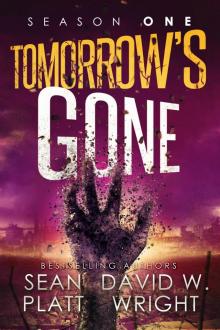 Tomorrow's Gone Season 1
Tomorrow's Gone Season 1 Yesterday's Gone: Episode 1
Yesterday's Gone: Episode 1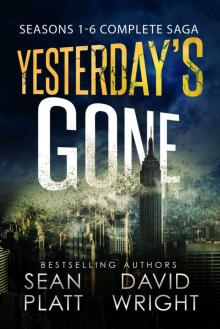 Yesterday's Gone: Seasons 1-6 Complete Saga
Yesterday's Gone: Seasons 1-6 Complete Saga The Beam- The Complete Series
The Beam- The Complete Series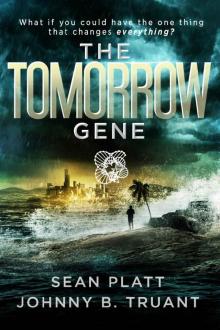 The Tomorrow Gene
The Tomorrow Gene Karma Police: Karma Police Book Two
Karma Police: Karma Police Book Two The Fall (Karma Police Book 5)
The Fall (Karma Police Book 5)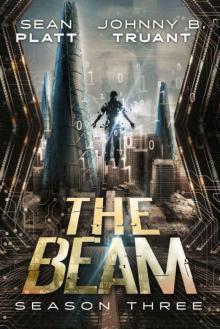 The Beam: Season Three
The Beam: Season Three Resurrection
Resurrection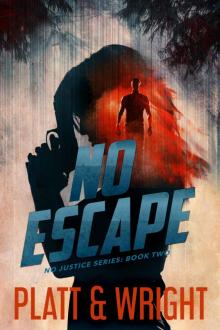 No Escape (No Justice Book 2)
No Escape (No Justice Book 2) Deviant (Karma Police Book 4)
Deviant (Karma Police Book 4)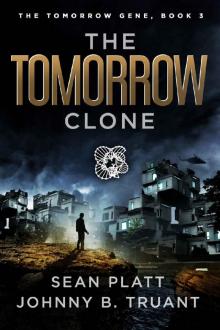 The Tomorrow Clone (The Tomorrow Gene Book 3)
The Tomorrow Clone (The Tomorrow Gene Book 3)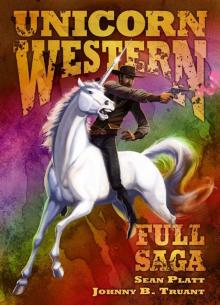 Unicorn Western
Unicorn Western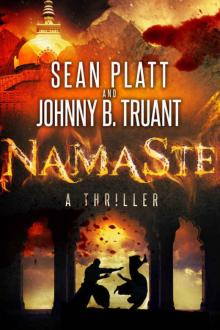 Namaste
Namaste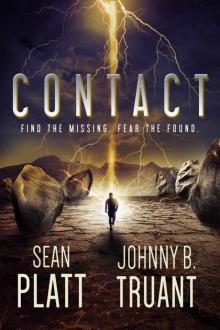 Alien Invasion (Book 2): Contact
Alien Invasion (Book 2): Contact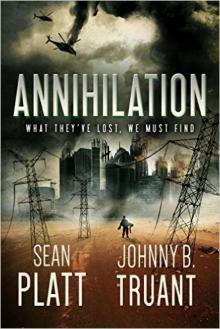 Alien Invasion (Book 4): Annihilation
Alien Invasion (Book 4): Annihilation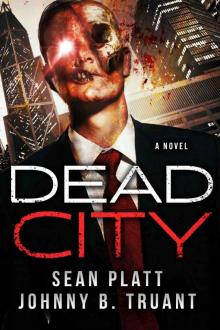 Dead City
Dead City The Eden Experiment
The Eden Experiment Unicorn Genesis (Unicorn Western)
Unicorn Genesis (Unicorn Western)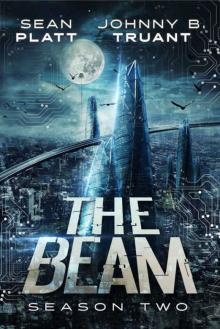 The Beam: Season Two
The Beam: Season Two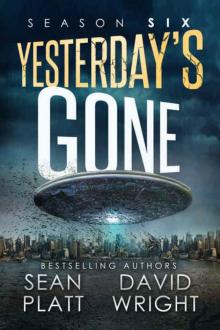 Yesterday's Gone: Season Six
Yesterday's Gone: Season Six Homecoming (Karma Police Book 6)
Homecoming (Karma Police Book 6)![[Alien Invasion 01.0] Invasion Read online](http://i1.bookreadfree.com/i1/03/30/alien_invasion_01_0_invasion_preview.jpg) [Alien Invasion 01.0] Invasion
[Alien Invasion 01.0] Invasion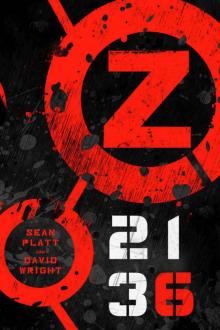 Z 2136 (Z 2134 Series Book 3)
Z 2136 (Z 2134 Series Book 3)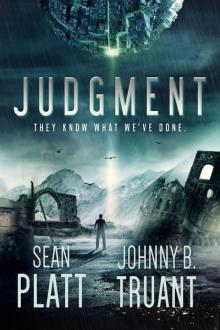 Alien Invasion (Book 5): Judgment
Alien Invasion (Book 5): Judgment Threshold
Threshold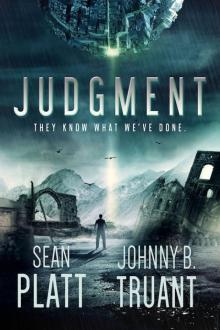 Judgment
Judgment Jumper: Karma Police Book One
Jumper: Karma Police Book One Boricio Goes Camping (Dark Crossings)
Boricio Goes Camping (Dark Crossings)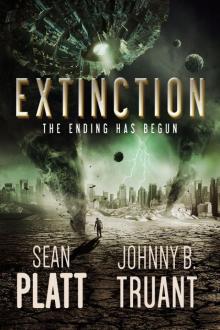 Extinction
Extinction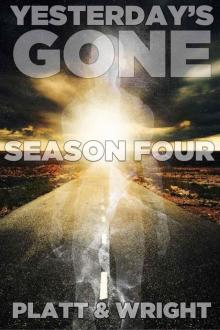 Yesterday's Gone (Season Four): Episodes 19-24
Yesterday's Gone (Season Four): Episodes 19-24![[No Justice 01.0] No Justice Read online](http://i1.bookreadfree.com/i2/04/09/no_justice_01_0_no_justice_preview.jpg) [No Justice 01.0] No Justice
[No Justice 01.0] No Justice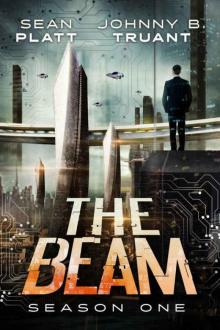 The Beam: Season One
The Beam: Season One La Fleur de Blanc
La Fleur de Blanc The Collectors (Karma Police Book 3)
The Collectors (Karma Police Book 3)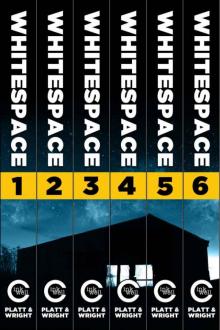 WhiteSpace: Season One (Episodes 1-6 of the sci-fi horror serial)
WhiteSpace: Season One (Episodes 1-6 of the sci-fi horror serial)